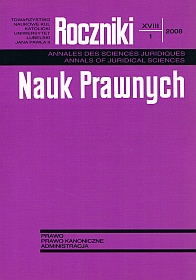The Significance of Essential Subjective Attributes in Determining Subjectivity Under International Law
Abstract
Current approaches to subjectivity do not stress the notion of attributes of international subjectivity. The definitions of subjectivity embrace this category in general terms (concentrating on the implication of rights and obligations directly from international law), granting such status mainly to individual entities. The resultant increase in the number and quality of potential international entities would make international turnover virtually impossible. This would in turn imply granting international subjectivity to concerns and carriers of domestic law, thus obscuring the scope and subjectivity of particular structures. Hence, clear research assumptions are needed as well as efforts to determine what subjectivity is. These are tentatively formulated in this article with the subjective attributes (i.e. the most essential and constituting qualities) emphasised. The range of subject categories is wide (states and their in statu nascendi forms, international organisations, recognised entities other than states and organisations, international bodies and conferences). An analysis of the normative aspect and implementation of international subjectivity makes it possible to exclude entities and persons from having such status.
References
Berezowski C.: Les sujets non-souverain du droit international, La Haye: RCADI 1938, t. 65.
Berezowski C.: Prawo międzynarodowe publiczne, cz. I, Warszawa: PWN–INP PAN 1966.
Bierzanek R., Symonides J.: Prawo międzynarodowe publiczne, Warszawa: WP LexisNexis 2004.
Brownlie I.: Principles of Public International Law, wyd. 6, Oxford: Oxford University Press 2003.
Cassese A.: Il diritto internazionale nel mondo contemporaneo, Bologna: Ed. Univ. 1984.
Cassese A.: International Law, Oxford: Oxford University Press 2005.
Cybichowski Z.: Prawo międzynarodowe publiczne i prywatne, wyd. 4, Warszawa: Wyd. Studium Prawa Publicznego UW 1932.
Czaja J.: Prawnomiędzynarodowy status Watykanu, Warszawa: WP PWN 1983.
Czapliński W., Wyrozumska A.: Prawo międzynarodowe publiczne. Zagadnienia systemowe, wyd. 2, Warszawa: C.H. Beck 2004.
Frankowska M.: Prawo traktatów, wyd. 2, Warszawa: SGH 2007.
Gilas J.: Prawo międzynarodowe, wyd. 2 zmienione i poprawione, Toruń: Pracownia Duszycki 1999.
Góralczyk W., Sawicki S.: Prawo międzynarodowe publiczne w zarysie, Warszawa: Wydawnictwo Prawnicze LexisNexis 2007.
Jessup Ph.: A Modern Law of Nations, New York 1948.
Klafkowski A.: Prawo międzynarodowe publiczne, Warszawa: PWN 1966.
Latoszek W., Proczek M.: Organizacje międzynarodowe. Założenia, cele, działalność, podręcznik akademicki, Warszawa: FSMI 2001.
Lauterpacht H.: International Law by L. Oppenhaeim, Vol. 1, London: Longmans 1948.
Łoś-Nowak T. (red.): Organizacje w stosunkach międzynarodowych. Istota. Mechanizmy działania. Zasięg, Wrocław: Wyd. UWr. 1999.
Makowski J.: Podręcznik prawa międzynarodowego, Warszawa: Sp. Książka 1948.
Makowski J.: Zasady prawa międzynarodowego, Warszawa: Druk P. Laksauera 1915.
Menkes J., Wasilkowski A.: Organizacje międzynarodowe. Wprowadzenie do systemu, Warszawa: Wydawnictwo Prawnicze LexisNexis 2004.
Nussbaum A.: A Concise History of the Law of Nations, New York: Macmillan 1954.
Oppenheim's International Law, 9th ed., red. R. Jennings, A. Watts, London: Longmans 1992, Vol. I-II.
Siotto-Pintor M.: Les sujets non-souverain autres que les Etats, La Haye: RCADI 1932, t. III.
Tyranowski J.: Integralność terytorialna, nienaruszalność granic i samostanowienie w prawie międzynarodowym, Warszawa–Poznań: PISM 1990.
Copyright (c) 2008 Roczniki Nauk Prawnych

This work is licensed under a Creative Commons Attribution-NonCommercial-NoDerivatives 4.0 International License.


